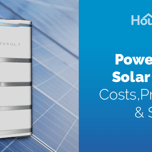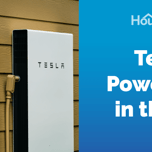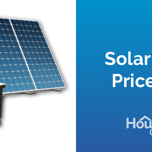Answer these simple questions and we will find you the BEST prices
Which type of solar quotes do you need?
It only takes 30 seconds
100% free with no obligation

Get up to 4 quotes by filling in only 1 quick form

Compare quotes and find yourself the best deal

Increase the value of your home by installing solar panels
- Householdquotes.co.uk
- Solar Batteries
Solar Battery Storage in the UK: A Comprehensive 2025 Guide

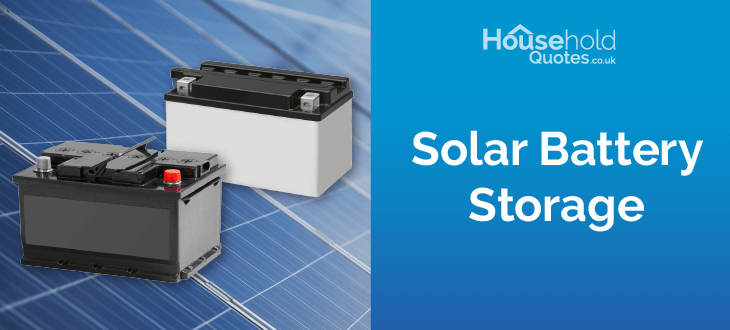
- Solar panel batteries are used to store any excess electricity generated by your solar panels for later use.
- A solar battery for a standard 2-3 bedroom house will cost approximately £3,500 – £4,000 and could save you up to £767 annually on your electricity bill.
- The biggest advantage of solar batteries is the potential for energy independence, while one of the biggest downsides is their upfront cost.
- The UK government has cut battery energy storage systems to 0% VAT, from 1 February 2024.
Are you considering investing in solar panels? Did you know that with an additional solar battery, a solar panel system in the UK could reduce your electricity bills by 70%?
Solar batteries store surplus energy from your solar panels, providing a continuous power supply day or night. Choosing the right battery depends on factors like storage capacity, lifespan, and cost.
While we always suggest consulting a professional installer, this guide is here to provide an estimate of the solar battery you might need and how much you can expect to pay. In this article, we'll explore the costs of solar batteries, their benefits, potential drawbacks, and some key ways that you can save on installation.
Finding the right installer can be time-consuming. Instead of spending hours researching online, try our free quotes service. Fill out our quick 30-second form, and we'll connect you with up to 4 reputable installers in your area. Compare their tailored quotes to find the best deal.
Click the button below for your free, no-obligation quotes.
- Quotes from local installers
- Payment by finance available
- Save up to £915 per year
It only takes 30 seconds

What is a solar battery and how does it work?
Solar batteries are designed to store the solar energy generated by your solar panels and provide a continuous supply of electricity.
Any surplus electricity produced by the solar panel system that you don't use can be stored in the solar battery and used on demand whenever you actually need it. They can also store grid-supplied power if needed.
Solar batteries are commonly made from lithium-ion or lead acid. How solar batteries work can differ depending on how they are coupled to your solar panels, using either a direct current (DC) or alternating current (AC).
Solar panels generate DC electricity, whereas household appliances operate on AC electricity. Therefore, before you can use the electricity generated from your panels, it must be converted into an AC current via the solar inverter. However, a solar battery can only ever store DC electricity.
So, in a DC-coupled setup, the electricity produced by your solar panels travels to the charge controller. From here, the DC current flows directly to the solar battery where it's stored for later use. This means that the electricity will only be inverted from DC to AC one time.
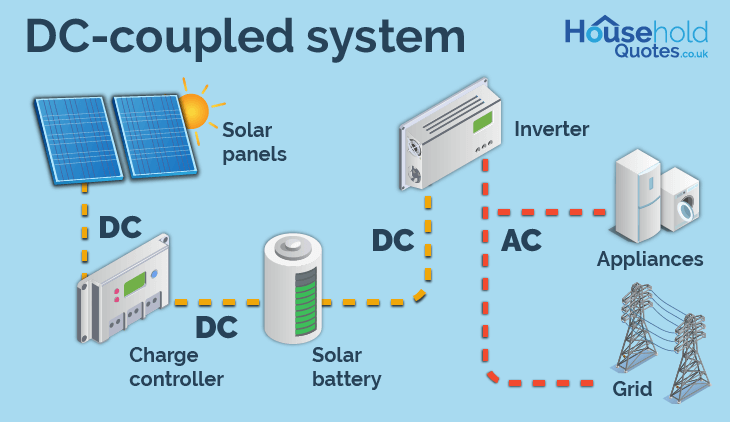
In an AC-coupled system, the process involves converting DC electricity to AC via the solar inverter. It can then be used to power your home, or it will be sent to a battery converter. Here, it will be inverted once more, back to DC electricity, so it can be stored in the solar battery.
AC-coupled systems are slightly less efficient than a DC system given the energy loss that comes from more inversions.
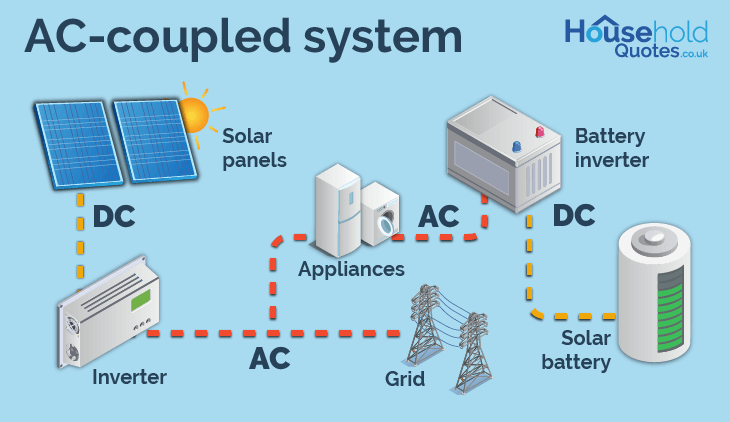
Why is a solar battery used in a solar panel installation?
Even the best solar panels can't run at their maximum efficiency all of the time, which is where a solar battery comes in. This additional power supply may be utilised during times when your solar panels aren't in operation, such as during cloudy weather conditions, or overnight. They also provide reliable backup electricity during power outages.
You can also use this stored electricity during peak hours to free yourself from having to pay for more expensive tariff rates. You may also wish to export any surplus electricity back to the national grid, and earn an income through the Smart Export Guarantee.
The most powerful solar batteries will help you get closer to complete energy independence- meaning no more relying on fossil-fuelled grid power and instead only using your own free, renewable electricity.
Types of solar batteries
The type of battery refers to the chemistry your battery uses. Different types of solar batteries offer different advantages in terms of efficiency, depth of discharge, and affordability, among other factors.
Good to know: solar battery efficiency refers to the ratio of the usable energy you can take from it to the energy stored in it. The depth of discharge refers to the percentage of the battery that's been discharged versus the battery's total capacity.
Let's take a look at the main types of solar batteries available today:
Lithium-ion solar batteries
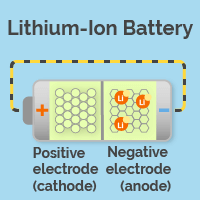
In lithium-ion batteries, lithium ions pass from the negative electrode (anode) to the positive electrode (cathode). As they do this, they release electrons which creates an electrical current that can be used to power the appliances in your home.
Lithium-ion batteries are the most popular type of solar battery in the UK market. They are fairly compact and lightweight while storing substantial amounts of energy. They can outlast other battery types and hold an impressive energy conversion efficiency rate, often reaching 95%.
It's worth noting that while lithium-ion batteries are often the most expensive choice, they have a higher usable capacity, with a typical depth of discharge of 80% or more.
Lead-acid solar batteries
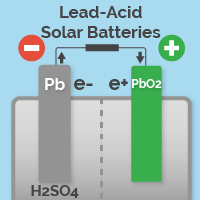
Lead-acid batteries feature lead plates in a sulfuric acid solution. These convert electrical energy into chemical potential during charging. This stored potential transforms back into electrical energy during discharge.
Despite being the oldest and most economical choice, lead-acid batteries have a shorter lifespan, lower discharge depth, and require frequent checks for potential hydrogen gas release.
Sealed and flooded lead-acid batteries are available, with sealed batteries being maintenance-free but having a shorter lifespan. Meanwhile flooded batteries need distilled water top-ups.
Advances in battery technology are introducing more alternatives to lead acid batteries to reduce the impact of toxic lead in the battery life cycle.
If you're sure that you'd like to incorporate a solar battery into your new solar PV system, then the next step is to find the right installer for the job.
Use our free quotes comparison service to connect with up to 4 top solar installers in your area. Instead of spending hours searching for installers online, let us match you with the most suitable ones for your situation.
Just fill out our quick 30-second form. It's free, quick, and you're not obligated to accept any of the solar quotes you receive.
Start today by clicking the button below.
- Quotes from local installers
- Payment by finance available
- Save up to £915 per year
It only takes 30 seconds

How much do solar batteries cost?
If you install a solar battery alongside your solar panels, then the price will vary significantly depending on the size of the solar panel system you install.
| Solar Battery Costs | |||
|---|---|---|---|
| Solar panel system | Solar panel system cost | Solar battery cost | Total cost including solar battery |
| 3kW | £5,000 – £6,000 | £2,500 – £3,500 | £7,500 – £9,500 |
| 4kW | £7,000 – £8,000 | £3,500 – £4,000 | £10,500 – £12,000 |
| 5kW | £8,000 – £9,000 | £4,000 – £5,000 | £12,000 – £14,000 |
| 6kW | £10,000 – £11,000 | £5,000 – £7,500 | £15,000 – £18,500 |
| 12kW | £13,000 – £15,000 | £9,500 – £10,000 | £22,500 – £25,000 |
If you'd like to learn more about various PV system sizes, check out our dedicated kW pages below:
- 3kW solar system with battery
- 4kW solar system with battery
- 5kW solar system with battery
- 6kW solar system with battery
- 12kW solar system with battery
As the solar battery industry continues to expand and become more commonplace, their price will also naturally decline. Therefore, these prices will likely fall over time.
Remember that these prices are only estimates meant as a guide. For the most accurate prices, tailored to your home, you should consult a professional solar installer.
Below we've provided a breakdown of solar battery costs, solar panel costs, and some maintenance costs you can expect post-installation.
| Solar Battery Installation + Maintenance Costs | |
|---|---|
| System component | Average costs |
| Solar battery | £2,500 – £12,500 |
| Solar panels (inc. installation) | £5,000 – £15,000 |
| Labour costs (per day) | £600 – £1,000 |
| Maintenance costs: cleaning panels | £10 / panel |
| Maintenance costs: annual service | £100 – £200 |
Solar batteries in the UK typically cost between £2,500 – £12,500, depending on the size of your house and how many solar panels you need to run your house. These factors will be influenced by how big your solar panels are and the best direction for your solar panels.
For example, a typical Powervault 3 cost can be between £5,500 to £15,000 while a Tesla Powerwall 2 can cost between £6,300 to £7,400.
There is a wide range of other factors that could also influence the price of your solar battery such as the type of battery, its usable capacity, and the brand you choose. Installation costs also vary according to the solar battery size and whether it's DC- or AC-coupled.
As you might expect, batteries with a higher usable capacity will cost more than those with lower usable capacity. Typically, solar batteries in the UK have a usable capacity that ranges from 1 - 15 kilowatts.
In general, it's more economical to install your solar battery alongside your solar panels, especially in terms of labour costs. Including solar panel system installation and labour costs, you can expect the total solar panels and solar battery installation to come between £8,100 – £28,500.
How much can you save by installing a home battery storage in the UK?
According to the Energy Savings Trust, a solar battery can help reduce your electricity bills by 70%. These savings are made up of the free energy generated from your panels, the surplus of free energy provided by your battery, and from grid service tariffs, like the Smart Export Guarantee (SEG).
With SEG, you could be paid for any stored electricity that you don't need by exporting it back to the grid. The amount you receive will depend on the tariff provider you sell it to. Generally, tariff rates range from 1-20p/kWh.
Using an example tariff rate of 5.5p/kWh, we've estimated the annual savings you can expect to make using a solar battery to sell your excess energy through SEG, according to the solar panel system you install.
| Solar Battery savings | |||
|---|---|---|---|
| House size | Solar panel system | Total savings including SEG payment | Total savings without SEG |
| Small; 1-2 bedrooms | 2 - 3kW | £527.25 | £486 |
| Medium; 2-3 bedrooms | 3 - 4kW | £767.50 | £729 |
| Large; 3-4 bedrooms | 5 - 6kW | £1,162 | £1,107 |
Remember the savings will vary according to your electricity consumption habits, the size of your home, and the supplier's tariff rates, and the current cost of electricity (as announced by Ofgem). These figures are only estimates and are meant as a guide.
That's why we always recommend that you consult a professional installer who can assess your home's needs and give you a better look at the potential benefits that solar energy can bring to your home.
With Household Quotes, finding the right installer is simple! Instead of spending hours searching for installers and getting quotes, let us connect you with up to 4 top installers in your area. Compare their free, customised quotes and choose the one that suits you.
Start by filling out our quick 30-second quotes form.
- Quotes from local installers
- Payment by finance available
- Save up to £915 per year
It only takes 30 seconds

Pros and cons of solar panel battery storage in the UK
- Maximise the use of the electricity generated by your solar panels.
- Earn an income through the Smart Export Guarantee.
- Get closer to energy independence
- Reliable backup power supply during power outages, depending on the model.
- Avoid overpaying for expensive tariffs during peak hours.
- As of feb 1st 2024, the UK government has cut battery energy storage systems 0% VAT, from 1 February 2024.
- Can be very expensive, costing up to £12,500 in some cases.
- Will likely need to be replaced before the rest of your solar PV system.
How do you choose the right solar battery for your home?
When choosing a new solar battery, there are some key other factors to consider. Perhaps most important is its storage capacity, which simply refers to how much electricity it can store.
Based on the amount of electricity your solar panel system is able to produce per day, we can determine what the appropriate battery size might be.
| Solar Battery Sizes | |
|---|---|
| Solar panel system | Required solar battery size |
| 3kW | 7kWh |
| 4kW | 9kWh |
| 5kW | 12kWh |
| 6kW | 14kWh |
| 12kW | 23kWh |
The exact storage capacity for your needs should be weighed up alongside your energy needs, which is usually indicated on your electricity bills as your average consumption.
Other important factors include the battery lifespan, its warranty, and the upfront cost. If you're still unsure about the best battery for your needs, then be sure to consult a professional solar installer before making your purchase.
Are solar batteries worth it for your UK household?
Solar panels can be financially infeasible for many considering their high upfront costs. Even average costs of £7,500 can already be too much for many households before you even consider solar battery and installation costs.
What's more, despite the additional savings that can be made from a solar battery, installing one will not significantly impact the overall time that it takes to break even on your solar panel system investment. With that being said, there are some government schemes that offer solar grants that can help reduce total costs.
However, for those who seek energy independence and want to make the most of the energy generated by their solar PV system, then a solar battery is a great addition that is well worth the cost. Just be sure to choose the best solar battery for your specific needs in order to fully reap its benefits.
If you've found yourself asking, "are solar panels worth it?", then you can be assured that with a solar battery you will make considerably more savings and you'll maximise the potential of your entire solar panel system.
Another key way to reduce the overall upfront costs of your new solar battery and PV system is by comparing quotes from multiple installers and going with the one that offers the best deal.
However, it can be tricky business to find reliable companies to get your quotes from, and you could risk handing your project over to the wrong hands. To compare only the most qualified, top-rated installers in your area, use Household Quotes' free comparison service.
All of the installers in our network are fully vetted by us and you're under no obligation to choose any of the offers you receive. Save yourself countless hours of searching, and let us do the hard work. You can be connected with up to 4 installers in just a few clicks. Click the button below to get started.
- Quotes from local installers
- Payment by finance available
- Save up to £915 per year
It only takes 30 seconds

Frequently asked questions
Depending on the battery capacity and your electricity demands, you can expect a solar battery to power a house for 12 – 24 hours.
A 5kW battery is more than enough to power the average UK home for at least a few days when fully charged.
When a solar battery reaches capacity, the excess electricity is directed back to the solar panels or it can be exported to the national grid.
Yes, you can fill your solar battery with cheaper off-peak electricity if you want to make use of the full battery capacity but there isn’t enough solar energy to capture during the day.

Ciaran is a content writer at Household Quotes. He has become an expert in energy saving and eco-conscious living which he uses to create informative content for Household Quotes readers.

